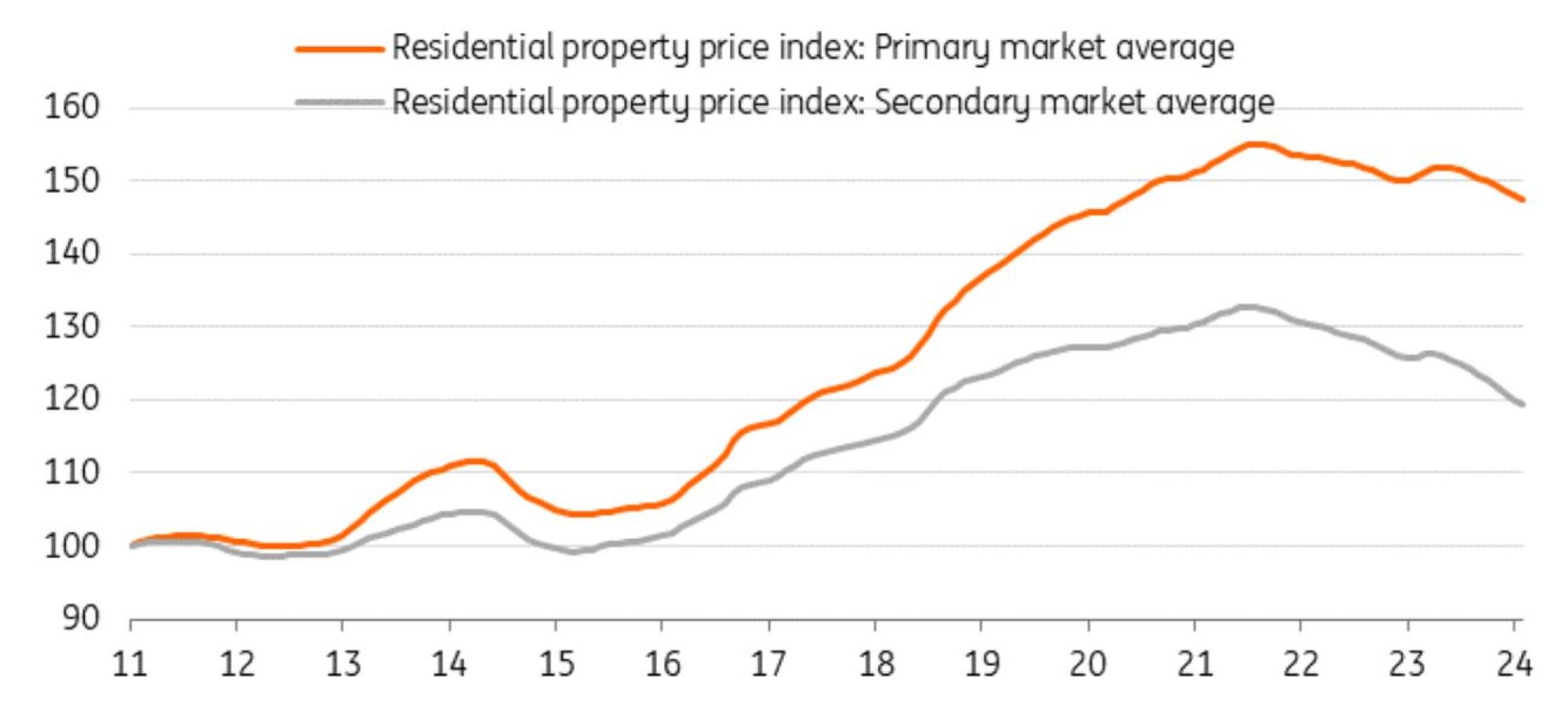
China struggles to arrest a 9-month slide in new home prices as cash squeeze among big developers keeps buyers on sidelines
- New home prices in 70 major Chinese cities declined for a ninth straight month in February, statistics bureau says
- More property easing measures can be expected, Goldman Sachs says, but L-shaped recovery seen at best given weak fundamentals
Prices of new homes in 70 medium and large cities fell 0.4 per cent from a month earlier, following a similar 0.4 per cent setback in January, according to data released by the statistics bureau.
New home prices weakened in 59 of the cities surveyed by the government, versus 56 in January, while prices for existing homes declined in 68 cities just like in January, the bureau said.
“There is a marginal improvement in home prices, and concerns about a rapid decline in prices have passed,” said Guan Rongxue, a senior analyst at Zhuge Real Estate Data Research Centre. Still, cities with weaker home prices continue to make up a big portion, which indicates a weak recovery momentum, she added.

Authorities in Beijing stepped up efforts this year to revive the housing market, including a larger than expected liquidity injection and a cut in interest rates tied to home mortgages. Beijing also created a “whitelist” of developers it deems worthy of financial support from lenders to ensure a smooth delivery of homes to buyers and to repay their borrowings.
The persistent slump indicates homebuyers are not rushing back into the market, worsening the cash flow problem for some of the nation’s biggest home builders. Reports this week showed companies including China Vanke and Country Garden Holdings struggling to cope with weak sales and liquidity as more debts come due.
China Vanke said on Friday that combined contracted sales in January and February, which included a week-long Lunar New Year holiday, amounted to 33.5 billion yuan. That’s a 43 per cent drop from the same period in 2023. Country Garden’s sales plunged 80 per cent to 9.2 billion yuan in the same corresponding period.
In Friday’s report, new home prices in Tier-1 cities dropped 0.3 per cent in February, matching January’s decline. Losses in Beijing, Shenzhen and Guangzhou ranged from 0.1 per cent to 0.8 per cent, while Shanghai experienced a 0.2 per cent increase. Meanwhile, prices in Tier-2 cities fell 0.3 per cent, after a 0.4 per cent drop in January.
Second-hand home prices in tier-1 cities recorded a month-on-month slide of 0.8 per cent last month, versus a 1 per cent monthly decline in January. Secondary home prices in tier-2 cities dropped 0.6 per cent month-on-month over the same period, basically in line with January’s decline.
Despite more local housing easing measures in recent months, the property markets in lower-tier cities still face strong headwinds from weaker fundamentals, Goldman Sachs analysts including Yuting Yang wrote in a note after the data was published. They cited net population outflows and oversupply, among the challenges.
China’s top 100 developers suffered a 60 per cent annualised drop in contracted sales to 185.9 billion yuan (US$25.8 billion) in February, according to data compiled by China Real Estate Information Corporation. They fell 49 per cent in the first two months this year to 421 billion yuan from the same period last year.
Ni Hong, minister of housing and urban-rural development, on Saturday pledged to coordinate with financial regulators to support “developers fairly on a project basis.”
“We continue to expect more housing easing measures in coming months, including more relaxation of home purchase restrictions in large cities, among others,” Goldman said in its report. “However, considering persistent property weakness related to lower-tier cities and private developers, such easing measures may only lead to an ‘L-shaped’ recovery in the sector in coming years.”


